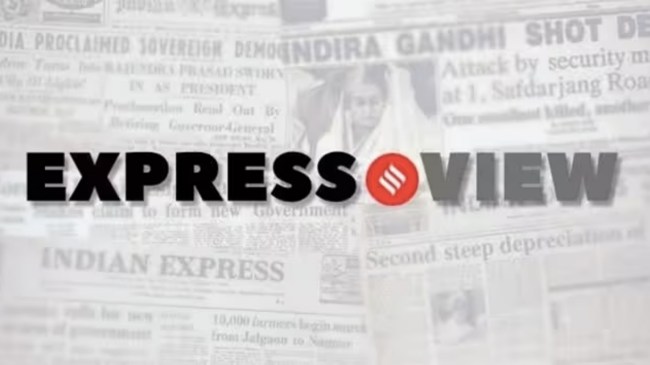Opinion Express view on Bharat Ratna Advani: His arc shows a rare capacity to reflect and reinvent
He was each and all of his many versions that shaped and reshaped the nation’s politics
 By honouring Advani with the Bharat Ratna now, the BJP commemorates a founding father in an opportune moment, and it does more than that.
By honouring Advani with the Bharat Ratna now, the BJP commemorates a founding father in an opportune moment, and it does more than that. The Bharat Ratna to BJP veteran LK Advani, just days after the consecration of the Ram temple at Ayodhya and the Bharat Ratna to socialist icon Karpoori Thakur, is remarkable for its timing. The two awards help the BJP to symbolically fold in both Mandal and Mandir.
Ahead of an important election, they underline the BJP’s efforts in nudging Mandal vs Mandir towards becoming Mandir plus Mandal. But this moment is also, and more, about LK Advani, the politician with an arc spanning over seven decades. Advani’s arc is impactful and controversial, not just because it is long, but also because it shows a rare breadth and movement, and an even more rare capacity to reflect and reassess and reinvent. He has been each and all of many versions of LK Advani.
The Organisation Man, who worked to strengthen the nuts and bolts of the party from within, mentored a second generation of leaders, and spoke his mind too. Marking the 40th anniversary of the Emergency, one year into the first term of the government of his ex-protege Narendra Modi, he cautioned on the task ahead, saying he could not rule out another curtailment of liberties.
The Parliamentarian, who steered important debates in the House, but was eventually overtaken by the Rath Yatri, who irreversibly changed the political narrative with his journey from Somnath to Ayodhya, using the idiom of religion and joining it to nationalism and patriotism, while sparking communal polarisation and triggering violence that led to the demolition of the Babri Masjid, an event that redirected the future course of the country’s politics. The Script Writer, alongwith the party’s more coalitionable face, Atal Bihari Vajpayee, of the BJP’s rise and rise, from a political “untouchable” in the aftermath of the demolition at Ayodhya, to the position of the second pole of politics, setting the scene for its edging out of the Congress to become, as it is now, its dominant pole.
The (less successful) Script Rewriter, who in 2005, was forced to step down as party president because he praised Jinnah in Pakistan and suggested he was “secular”, and who told this paper in a 2010 interview, on the 20th anniversary of his Somnath-Ayodhya rath yatra, that “my party lost an opportunity” during the Jinnah row, of being seen as proud of Hinduism but not anti-Muslim or anti-Pakistan. Said Advani: “If I had any apprehension that the incident (Babri demolition) could take place, I would not have gone to Ayodhya… I’d still have gone to Pakistan”.
By honouring Advani with the Bharat Ratna now, the BJP commemorates a founding father in an opportune moment, and it does more than that: It also sends out a message of its continuing inventiveness in sending out messages. It has shown political dexterity earlier in deploying the Ratna. But in a time when spaces of grace and generosity are shrinking in politics, not without the active contribution and complicity of the BJP, with this high award to someone seen as a mentor who also raised concerns, Prime Minister Narendra Modi sets an example even as he scores a political point.



